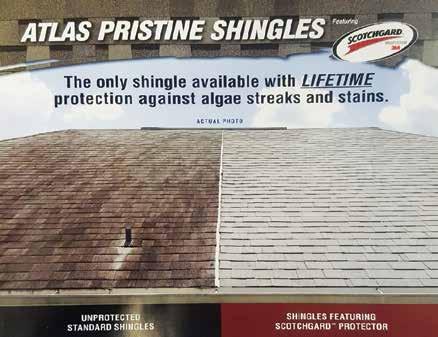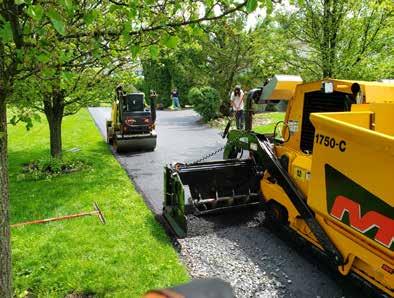
4 minute read
Are Space Heaters Safe? 10 Things to Know
Familyhandyman.com

When the temperature drops, a portable space heater can be a convenient source of supplemental heat for your home. One common question is: Are space heaters dangerous? No, unless yours is really old or you're using it incorrectly. Make sure you're using yours correctly with these tips.
Space heaters are a great option for that stubborn corner of your home that just won’t get warm, no matter what the thermostat says. They can also help your HVAC system by letting you warm up a room you’re using without cranking the heater for the whole house.
But there are some downsides. Used improperly, they can make you uncomfortable rather than cozy. Space heaters can also be a fire hazard if you’re not following a few basic rules. In fact, space heaters are responsible for about 1,700 fires and 80 deaths per year, according to the US Consumer Product Safety Commission.
Make sure your home stays warm and dry during winter with a solid roof. Stay ahead of any roof trouble and inspect it thoroughly or, better yet, hire a professional to do it. Check that your roof has not sprung any leaks during the past year, and replace any shingles that are cracked, missing or curling. Regular inspections and maintenance of your roof will help prolong its life. If your roof does need major repairs or replacements, consider gathering multiple estimates from reputable contractors.
Before you turn on your space heater, it’s essential to know a few things about how it works and some general rules to follow for using one in your home.
Give your windows a thorough check-up
Clean your patio furniture thoroughly before putting it away for the winter. Empty the dirt in any decorative clay or ceramic pots – otherwise it can freeze and crack the pots. More importantly, check for any cracks or dents in your deck or patio. If there are any, you should fix them as a matter of priority. Any small problem you have now will grow bigger during the cold season, especially if water gets into the cracks and freezes.
Inspect your heating system and chimneys
1. Follow the instructions
Heat leakage from windows can have a severe impact on your energy bills during the cooler seasons. It is no wonder that savvy home owners always make it a point to check on their windows during fall, before the cold weather kicks in.
Your space heater should have a label that shows it was tested in a recognized laboratory. Before using the heater, read and understand the manufacturer’s instructions and warning labels.
If you follow the instructions, the answer to the question “are space heaters safe?” is yes.
2. Use for supplemental heat only
A space heater is meant to provide supplemental heat only. They should never be used to warm linens, cook food or dry clothing. While they may work to warm up smaller rooms in your home, they are not very energy-efficient appliances. In fact, the Department of Energy’s EnergyStar program doesn’t certify space heaters for this reason. Space heaters should be used as a short-term fix opposed to a long-term solution.
3. Make sure your smoke alarms work
This is essential whether you're using a space heater or not, but given the risk of fire associated with portable, plug-in heaters, make sure your smoke alarms are in good working order. Remember, most smoke detectors only last about 10 years, so if yours are older than that, it’s time for new ones. Unless you have a hardwired smoke detector, change the batteries twice a year; most people make that a regular maintenance task when they set the clocks forward and backward when the time changes in the spring and fall.
Whatever heating system you are using, now is the perfect time to get it checked. Take the opportunity to also inspect any smoke and fire detectors, carbon monoxide detectors.
4. Check the cord
If you plan to use your fireplace, the chimney must be inspected by a professional. You

Check the cord for cracks and make sure the plug isn’t broken. When plugging in, make sure the connection is secure. Loose connections can be a fire hazard and are inherently dangerous. You can fix a damaged cord, but don’t use the space heater if the cord is replaced or repaired.
5. Don’t leave unattended
Space heater safety 101: when leaving a room, turn the space heater off. You should also turn the heater off when sleeping and never allow pets or children to play too close to the heater. Have a little one at home? Make sure you’re always watching them while the space heater is on. You don’t want them burning themselves.
6. Keep it out of the way
A cord in the middle of a hallway or laid across a high traffic area between the living room and the kitchen is an accident waiting to happen. Keep your space heater in a corner or an area of the room where people aren’t walking so that nobody trips on it. Not only is it dangerous for the person walking, it could result in the heater getting too close to flammable materials.
7. Plug directly into an outlet
It’s tempting to use an extension cord to get the heater exactly where you want it, or jamming into a crowded power strip so you don’t have to unplug another device. Don’t. Space heaters draw considerable electric current, which can shock you and overheat extension cords and power strips.
8. Keep away from flammable material
Make sure space heaters are kept at least 3 feet away from anything that can burn. That
Maxx Amusements (0)
Earl Holland Sr 558
Daku Auto Body (1)

Marc Beichey 664 (228-247)
Scott Bortz 646 (214-246)
Al Davidson637 (211-212-214)
Bob Faustner 611 (215-209)
Bob Daku 587 (213)
Stars & Strikes (3)
Bob Davidson Jr 660 (215-201-244)
Bob Davidson III653 (215-248)
Lee Hilbert 619 (203-237)
Frank Pavlov 572 (212)
Ben Bogdan 572 (243)

Vince Bauer Fiberglass Repair (3)
Wyatt Davidson 657 (211-230-216)
Rice Family (1)
Dale Fye 543 (221) your mind at ease.
10. Look at watts
Look at the wattage to determine how much heat a space heater will produce. Most electric space heaters range from 400 to 1,500 watts. Additionally, many models will allow you to adjust the output over a given range.






